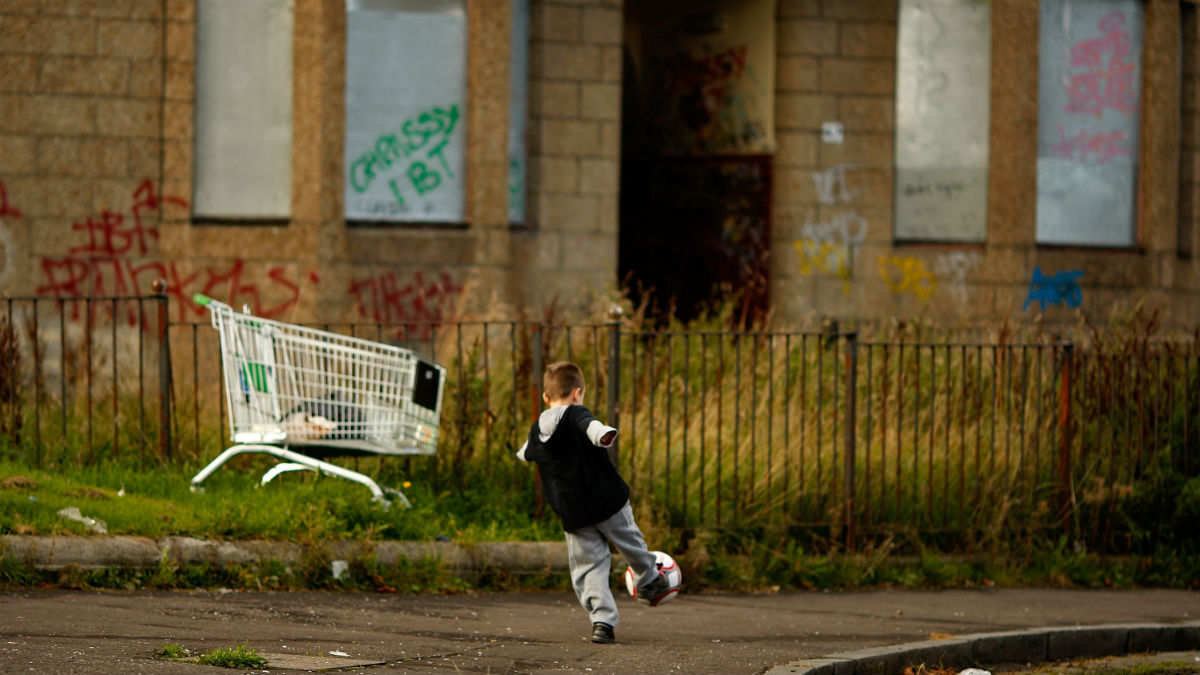Coronavirus: what would a ‘recession to end all recessions’ look like?
Chancellor warns UK is set for ‘unprecedented’ economic downturn as result of pandemic

A free daily email with the biggest news stories of the day – and the best features from TheWeek.com
You are now subscribed
Your newsletter sign-up was successful
Experts are predicting a “mega-recession” in the UK as newly published official figures show that the economy contracted at the fastest pace on record in March.
Chancellor Rishi Sunak this week said that the downturn would be “unprecedented”, adding: “It is very likely that the UK is facing a significant recession at the moment and this year.”
This warning has been echoed Paul Johnson, director of the Institute for Fiscal Studies think-tank, as data from the Office of National Statistics (ONS) shows that Britain’s GDP fell by 5.8% in March.
The Week
Escape your echo chamber. Get the facts behind the news, plus analysis from multiple perspectives.

Sign up for The Week's Free Newsletters
From our morning news briefing to a weekly Good News Newsletter, get the best of The Week delivered directly to your inbox.
From our morning news briefing to a weekly Good News Newsletter, get the best of The Week delivered directly to your inbox.
“It is a mega-recession. It is a recession to end all recessions, in terms of its scale,” Johnson told BBC Radio 4’s World at One.
With the economy expected to continue feeling the effects of the coronavirus pandemic until at least the end of 2021, what should we expect?
Jobs
For the country’s job market, “the bad news isn’t even close to the peak” says The Telegraph’s economic editor Russell Lynch.
A free daily email with the biggest news stories of the day – and the best features from TheWeek.com
“Even as infection rates slow and the economy begins the most tentative of reopenings, the tens of thousands of jobs already lost to the virus could merely be the grisly prologue to an employment tragedy unfolding months – and possibly years,” Lynch continues.
The crisis will be worst than that during the 2008 financial crash, and possibly even the Great Depression of 1929, predicts Ewan McGaughey, a senior lecturer in law at King’s College London.
“If there’s mass unemployment, people will not automatically be rehired when (or if) the virus is contained,” he says. “Business will go bust, or may fire more people: a sinking spiral of dole queues and shuttered shops.”
“This is going to be a global pandemic of unemployment,” agrees David Blustein, a professor of counselling psychology at Boston College and the author of The Importance of Work in an Age of Uncertainty.
“I call it a crisis within a crisis,” Blustein told the BBC.
Property market
The government this week gave the go-ahead for the housing market to restart following almost two months of lockdown. Estate agents can now reopen, property viewings may resume and removal firms and conveyancers can restart operations.
But estate agents are expected tough times ahead, with property search and information site Zoopla last month forecasting that “completed sales will be 50% lower in 2020 than 2019, allowing for a proportion of stalled sales to complete and with a delay to sales that would have progressed”.
Estate agency giant Knight Frank is predicting a 3% house price dip across the UK this year, with a 2% dip in London.
And MoneyWeek executive editor John Stepek has warned that a quick recovery is unlikely.
“The estate agent optimists argue that there will be pent-up demand, but I don’t think we’ll get a V-shaped recovery,” he says.
“A lot of people who had wanted to move will either find that they can’t be bothered any more, or that they are too worried about job security to do so.”
Coronavirus debt
A leaked internal Treasury document suggests that the coronavirus outbreak could cost the government £300bn this year alone - and that income-tax rises, a two-year public pay freeze and an end to the triple lock on state pensions may be required to make up for the lost cash, The Times reports.
However, senior Tories are said to have warned Boris Johnson against the proposed tax hikes and spending cuts.
An unnamed cabinet minister told the newspaper: “It is completely the wrong approach, it would entrench the downturn.
“We should be looking at policies that open up the economy - we will need fiscal stimulus. Taxes need to be lower rather than higher.”
Former Tory chancellor Norma Lamont added: “In the short run, one should let the recovery take hold, not abort the recovery with fiscal adjustments, be they tax increases or spending cuts. But over time, the problem of borrowing and the deficit will have to be addressed.”
The leaked Treasury document forecasts that the UK could end the year with a £337bn budget deficit, and suggests that the proposed measures could raise up to £30bn to help fund the increased national debt.
–––––––––––––––––––––––––––––––For a round-up of the most important stories from around the world - and a concise, refreshing and balanced take on the week’s news agenda - try The Week magazine. Start your trial subscription today –––––––––––––––––––––––––––––––
Impact of poverty
Recessions inevitably push more people into poverty, often as a result of long-term unemployment - and often with fatal results.
A study led by Oxford University researchers found that 2015 alone, 30,000 deaths were linked to Conservative cuts to the NHS and social care.
And according to The Guardian, “academics from the universities of Bristol, Manchester and Oxford estimate that an 1,000 extra deaths from suicide and an additional 30,000-40,000 suicide attempts may have occurred from 2008-2010 following the economic downturn”.
Now, the UK’s chief statistician has warned that the coronavirus-triggered economic downturn may lead to a “significant number of deaths”, reports HuffPost.
“If, and I stress if, we end up with an L-shaped recession, as opposed to a V-shape, where we come back out quite quickly, an L-shape over a long period of time could lead to a significant number of deaths as a result of people being pushed into poverty or into long-term unemployment,” Professor Ian Diamond, head of the ONS, told the Commons’ Public Administration and Constitutional Affairs Committee.
-
 How the FCC’s ‘equal time’ rule works
How the FCC’s ‘equal time’ rule worksIn the Spotlight The law is at the heart of the Colbert-CBS conflict
-
 What is the endgame in the DHS shutdown?
What is the endgame in the DHS shutdown?Today’s Big Question Democrats want to rein in ICE’s immigration crackdown
-
 ‘Poor time management isn’t just an inconvenience’
‘Poor time management isn’t just an inconvenience’Instant Opinion Opinion, comment and editorials of the day
-
 How corrupt is the UK?
How corrupt is the UK?The Explainer Decline in standards ‘risks becoming a defining feature of our political culture’ as Britain falls to lowest ever score on global index
-
 The high street: Britain’s next political battleground?
The high street: Britain’s next political battleground?In the Spotlight Mass closure of shops and influx of organised crime are fuelling voter anger, and offer an opening for Reform UK
-
 Is a Reform-Tory pact becoming more likely?
Is a Reform-Tory pact becoming more likely?Today’s Big Question Nigel Farage’s party is ahead in the polls but still falls well short of a Commons majority, while Conservatives are still losing MPs to Reform
-
 Taking the low road: why the SNP is still standing strong
Taking the low road: why the SNP is still standing strongTalking Point Party is on track for a fifth consecutive victory in May’s Holyrood election, despite controversies and plummeting support
-
 What difference will the 'historic' UK-Germany treaty make?
What difference will the 'historic' UK-Germany treaty make?Today's Big Question Europe's two biggest economies sign first treaty since WWII, underscoring 'triangle alliance' with France amid growing Russian threat and US distance
-
 Is the G7 still relevant?
Is the G7 still relevant?Talking Point Donald Trump's early departure cast a shadow over this week's meeting of the world's major democracies
-
 Trump-Musk relationship implodes in taunts, threats
Trump-Musk relationship implodes in taunts, threatsspeed read Musk said Trump's multitrillion bill would cause a recession and accused the president of involvement with Jeffrey Epstein
-
 Angela Rayner: Labour's next leader?
Angela Rayner: Labour's next leader?Today's Big Question A leaked memo has sparked speculation that the deputy PM is positioning herself as the left-of-centre alternative to Keir Starmer